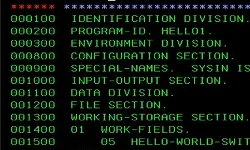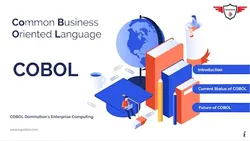
IBM COBOL Core 
This IBM COBOL Core course will teach you the fundamentals of the language, including scalability, maturity, and self-documenting features. You'll learn how to handle tables, edit, use switches, numeric usage, and structured COBOL. Join us and explore the world of COBOL! ▼
ADVERTISEMENT
Course Feature
![]() Cost:
Cost:
Free
![]() Provider:
Provider:
Coursera
![]() Certificate:
Certificate:
Paid Certification
![]() Language:
Language:
English
![]() Start Date:
Start Date:
24th Apr, 2023
Course Overview
❗The content presented here is sourced directly from Coursera platform. For comprehensive course details, including enrollment information, simply click on the 'Go to class' link on our website.
Updated in [May 25th, 2023]
The IBM COBOL Core course provides an introduction to the COBOL programming language. Students will learn the key aspects of COBOL, such as scalability, maturity, and self-documentation. Additionally, the course will cover topics such as handling tables, editing, using switches, numeric usage, and structured COBOL. This course is designed to give students a comprehensive overview of the COBOL language and its capabilities.
[Applications]
Upon completion of this course, participants can apply their knowledge of COBOL to develop applications for a wide range of businesses. They will be able to use the language to create scalable, mature, and self-documenting programs. Additionally, they will be able to handle tables, edit, use switches, numeric usage, and structured COBOL.
[Career Paths]
1. COBOL Programmer: COBOL Programmers are responsible for writing, testing, and maintaining code written in the COBOL language. They must have a strong understanding of the language and be able to troubleshoot any issues that arise. The demand for COBOL Programmers is increasing as more businesses are turning to the language for their programming needs.
2. COBOL Developer: COBOL Developers are responsible for developing applications using the COBOL language. They must have a strong understanding of the language and be able to create efficient and reliable applications. As businesses continue to move towards the language, the demand for COBOL Developers is increasing.
3. COBOL Analyst: COBOL Analysts are responsible for analyzing and optimizing existing COBOL code. They must have a strong understanding of the language and be able to identify areas of improvement. As businesses continue to move towards the language, the demand for COBOL Analysts is increasing.
4. COBOL Consultant: COBOL Consultants are responsible for providing advice and guidance to businesses on how to best utilize the COBOL language. They must have a strong understanding of the language and be able to provide solutions to any issues that arise. As businesses continue to move towards the language, the demand for COBOL Consultants is increasing.
[Education Paths]
1. Bachelor of Science in Computer Science: This degree path provides students with a comprehensive understanding of computer science principles and technologies. Students will learn about programming languages, software engineering, computer networks, and operating systems. This degree path is ideal for those interested in developing and maintaining computer systems and applications. Additionally, the degree provides students with the skills to design and develop software applications and systems.
2. Master of Science in Information Technology: This degree path provides students with a deeper understanding of information technology principles and technologies. Students will learn about database management, software development, network security, and web development. This degree path is ideal for those interested in developing and maintaining information systems and applications. Additionally, the degree provides students with the skills to design and develop software applications and systems.
3. Master of Science in Computer Science: This degree path provides students with a comprehensive understanding of computer science principles and technologies. Students will learn about programming languages, software engineering, computer networks, and operating systems. This degree path is ideal for those interested in developing and maintaining computer systems and applications. Additionally, the degree provides students with the skills to design and develop software applications and systems.
4. Master of Science in Artificial Intelligence: This degree path provides students with a comprehensive understanding of artificial intelligence principles and technologies. Students will learn about machine learning, natural language processing, computer vision, and robotics. This degree path is ideal for those interested in developing and maintaining AI systems and applications. Additionally, the degree provides students with the skills to design and develop AI applications and systems.
The development trends for these degree paths are focused on the use of emerging technologies such as artificial intelligence, machine learning, and natural language processing. Additionally, the focus is on developing applications and systems that are secure, reliable, and efficient. As technology continues to evolve, these degree paths will continue to be in demand as businesses look to develop and maintain their systems and applications.
Course Syllabus
Numeric Usage Types, Editing, and Branching
In the first module of this course, we will discuss numeric usage types, editing, and branching, including defining compound and negated conditions, describing four condition names to clarify and reduce coding, using switches in a program, and describing numeric data types of display.Structured Programming, Testing, Debugging, and Reports
In the second module of this course, we will discuss structured programming, testing, debugging, and reports, including, defining a calling program and called program, describing types and components of reports, listing steps for proper testing and strategies, recognizing and correcting unstructured code, describing the components of structured programming, and creating readable and maintainable code.Table Handling, Sorting, and Intrinsic Functions
In the third module of this course, we will discuss table handling, sorting, and intrinsic functions, including, listing six types of intrinsic functions, describing the sort/merge process, using three examples of sequential search, and describing basic table terminology.Pros & Cons

Excellent course

Helps to remember and learn better

Increases knowledge in Cobol Core

No coding examples

No referal value for new learners

Limited scope of topics covered
Course Provider

Provider Coursera's Stats at AZClass
Discussion and Reviews
0.0 (Based on 0 reviews)
Explore Similar Online Courses

Learn SEO For Wordpress Websites

Tour of the Solar System

Python for Informatics: Exploring Information

Social Network Analysis

Introduction to Systematic Review and Meta-Analysis

The Analytics Edge

DCO042 - Python For Informatics

Causal Diagrams: Draw Your Assumptions Before Your Conclusions

Whole genome sequencing of bacterial genomes - tools and applications

Mainframe COBOL Tutorial

COBOL

Mainframe COBOL
 Related Categories
Related Categories
Quiz
 Submitted Sucessfully
Submitted Sucessfully
1. What is the main purpose of COBOL?
2. What are the key aspects of COBOL?
3. What topics will be covered in this COBOL CORE class?


Start your review of IBM COBOL Core